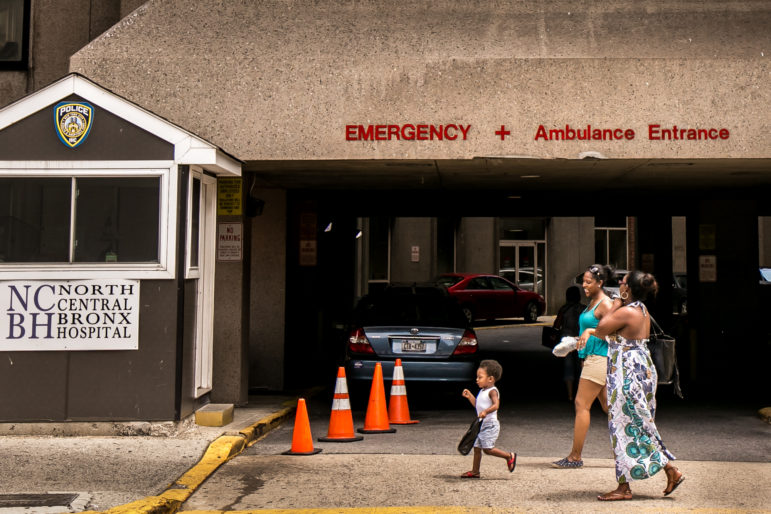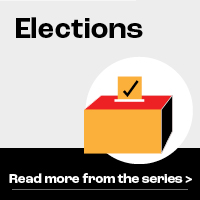Candidates for NYC mayor pitched policies on a range of topics last week—and people running for comptroller, borough president, district attorney and Council joined in.

Adi Talwar
North Central Bronx Hospital, one of the city’s 11 public hospitals. Four candidates—Ray McGuire, Scott Stringer, Maya Wiley and Andrew Yang—pitched policies last week involving the system.The Policy Shop, a weekly feature, summarizes the recent platforms and proposals put forth by candidates running for citywide office, borough president, the City Council and district attorney. Read previous installments in the series here.
McGuire on healthcare and small businesses
According to mayoral hopeful Ray McGuire, it costs $255 to start a small business in New York City—a small fee that McGuire says he will work to eliminate. He also pledges to start a NYC MBA program with CUNY to provide know-how to entrepreneurs, use the city’s buying power to secure vacant retail space for small businesses, create easier access to capital and make regulations easier to deal with. Among his promises: craft a “small business impact statement” for every new law. “Just as we conduct a fiscal impact statement on new legislation, so we should understand the business impact of a bill before it becomes a law,” McGuire said in a speech. The former Citigroup executive also unveiled a Doctors to the People plan, calling for two mobile doctor’s offices to roam each borough every day.
Yang on long-haul COVID-19 and placard abuse
Few laminated documents in human history have engendered as much scorn as parking placards—the dashboard decorations that permit employees of certain departments to violate parking restrictions the rest of us must live by. Andrew Yang last week came out in favor of a Council bill to empower residents to complain about placard abuse, and vowed to fully implement the de Blasio administration’s pilot of digital placards, which the current mayor announced last year. Yang also promised to improve funding for placard enforcement and reduce the number of placards in circulation. In a separate plan, Yang promised more research on long-haul COVID-19 and support for people suffering from its effects, including an effort to “educate the public about disability discrimination and workplace rights related to COVID-19.”
Garcia on aging and foster care
An adoptee herself, mayoral candidate Kathryn Garcia is proposing reforms of the city’s foster-care system. She calls for the adoption of a race-blind removal process for child abuse and neglect investigations, and for steps to improve the odds that older foster children will be adopted and avoid “aging out” without a system of support. Garcia also wants to increase access to income, food and childcare supports to protect families from the resource deficits that are sometimes mistaken as parental neglect. Later on last week, Garcia released her policy for addressing the needs of older adults, in which she promised to close the digital divide, invest in fitness programs for older people, intensify outreach for the Senior Citizens Rent Increase Exemption and close the digital divide.
Stringer on health equity and more
Scott Stringer would as mayor appoint a “chief health officer” to coordinate public hospitals with the health departments, launch a NYC Public Health Corps to permit rapid deployment of trained staff during health emergencies, and expand access to primary care so no New Yorker has to travel more than 20 minutes to reach a primary care facility. Stringer also outlines a focus on serious mental illnesses and the opioid crisis, and makes a commitment to shoring up the shaky finances of the public hospital system. Also last week, Stringer (wearing his comptroller hat) testified to the Board of Corrections regarding solitary confinement, wrote to U.S. Transportation Secretary Pete Buttigieg about New York’s infrastructure needs and announced an expansion in halal free meals.
Wiley on schools and maternal mortality
Mayoral candidate Maya Wiley’s plan for K-12 education includes some conventional elements, like a promise to hire 1,000 new teachers, a vow to simplify admissions processes and a commitment to having a full-time social worker in each school. But the sweeping proposal goes well beyond those features to include promises that have become cause célèbre, like ending admissions screens, as well as “next step” ideas like “creating accelerated learning models that invest in gifts and talents of all children” and permitting students a more meaningful role in school governance. Separately, Wiley unveiled a plan to address maternal mortality by creating birthing centers at every public hospital and on Staten Island (where there is no public hospital) and expending midwifery services within the public system.
Donovan hits the highlights
Shaun Donovan put out more and more detailed policies early in the race than any other candidate—eventually anthologized in a 200-page book—and now he’s highlighting a specific idea daily in a 70-day countdown to the primary. In recent days, he’s emphasized elements of his “innovation platform” and his call to “prepare New York City residents for our net zero economy, with a focus on the skills required for building retrofits and offshore wind production.”
Candidates push for gig-worker sick leave
Comptroller candidate Brad Lander last week led a group of elected officials and candidates in calling for the City Council to advance Intro. 1926, which would expand the city’s paid sick leave policy to include independent contractors—people like “app-based delivery workers, for hire vehicle drivers, nail salon workers, and some day laborers,” according to its proponents, who include mayoral candidate Dianne Morales, borough president candidate and Councilmembers Jimmy Van Bramer of Queens and Antonio Reynoso of Brooklyn, several Council candidates, the Workers Justice Project and the New York Taxi Workers Alliance. The coalition says the bill “has been stalled by City Council leadership since a hearing last May,” but the measure does only have 11 cosponsors in the 51-member body, and other bills with far broader support have languished longer.
Lander calls for NYPD to (largely) exit traffic enforcement
In the wake of the police killing of Daunte Wright in Minnesota, Lander last week reissued his traffic safety plan and called for the NYPD to be removed from “routine traffic enforcement,” like broken taillights or failure to wear a seatbelt. Under Lander’s plan, “NYPD officers would only enforce driving behavior that visibly and immediately endangers public safety” like “drag-racing, visibly erratic, aggressive, intoxicated, or road-rage driving.”
MCC wants late-night eating back
Comptroller candidate Michelle Caruso-Cabrera is calling for the lifting of all curfews on restaurants, arguing that “while the restaurant curfew made sense earlier this year when few New Yorkers were vaccinated and many businesses were shuttered, it is hurting restaurant owners, workers, and patrons alike at a time when a true comeback for New York City is hanging in the balance.”
Patel on the unbanked
Reshma Patel, a long-shot candidate for comptroller, believes the city’s next chief financial officer should do more to connect New Yorkers to the financial system; some 825,000 adults in the city do not have a traditional checking account. Patel believes the comptroller can help close that gap by creating more transparency around bank fees, launching a financial literacy program and advocating for a better interface between public benefits and digital banking.
Orlins targets environmental justice
A dominant feature of this year’s race for Manhattan district attorney is that almost every candidate is proposing less prosecution of crimes that have traditionally been in the DA’s portfolio (sex crimes and resisting arrest, to name a couple) and more prosecution of crimes that the DA has not emphasized, like housing violations and wage theft. Eliza Orlins is proposing an Environmental Justice Unit that would target lead paint, mold and pollution and look to see whether corporations were lying to investors about the ecological risks they are taking.
Boylan makes accessibility pledges
New York City’s disabled population—estimated to be at least 900,000 strong—rarely gets much attention during campaign season, or at any other time. Manhattan borough president candidate Lindsey Boylan is vowing to change that with a wide-ranging set of policy commitments issued last week. While some of her proposals are not things she can directly deliver (she will “fight like hell” to improve transit accessibility) or lack detail (she calls for disaster evacuation plans that take disabilities into account), her platform includes several real commitments: incorporating the needs of the disabled community into her consideration of land-use proposals, making public hearings and meetings more accessible, deciding on appointments to boards and commissions “with disability rights and accessibility in mind” and “hiring people with disabilities in the Borough President’s office in high level roles.”










One thought on “Policy Shop: Placard Abuse, Foster Care and Health Equity”
So what do hundreds? thousands? of people who live above, or near these open outside
late restaurants do to EVER get some peace from the noise.
Every candidate should spend a week living in that environment.